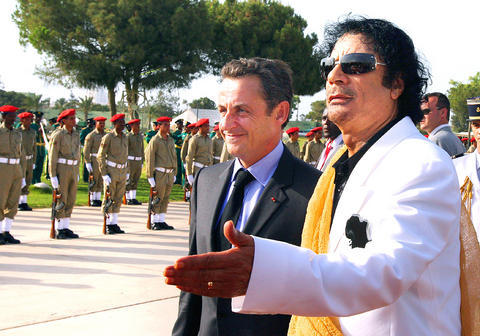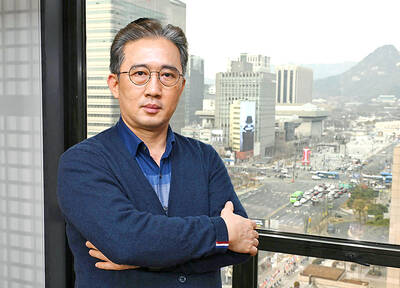France and Libya on Wednesday inked a deal on the building of a nuclear reactor for water desalination during talks between Libyan leader Muammer Qaddafi and French President Nicolas Sarkozy, a day after the release of six foreign medics.
Sarkozy had touted his visit of less than 24 hours as a "political trip" to help Libya's reintegration into the international community after decades of sanctions and isolation.
Soon after his late afternoon arrival in Tripoli, Sarkozy and his delegation including French Foreign Minister Bernard Kouchner were accorded an official welcome at Qaddafi's Bab Azizia palace.

PHOTO: AFP
Qaddafi and Sarkozy then went into talks while Kouchner and his Libyan counterpart, Abdel Rahman Shalgham, signed a raft of agreements, including a memorandum of understanding to build a Libyan nuclear reactor for water desalination.
The agreement "aims to furnish Libya with a nuclear reactor that makes it possible to meet one of its important needs -- a supply of drinking water," French presidential aide Claude Gueant told reporters at the signing ceremony.
"Drinking water is rare in Libya, so the aim is to allow the desalination of sea water" using nuclear energy, Gueant added.
The two ministers also signed accords relating to military-industrial cooperation, cultural, scientific and technical assistance and cooperation in the field of research, officials said.
The deals came a day after Tripoli's release of six foreign medics held in Libya since 1999 and whose death sentence for infecting children with the AIDS virus was commuted.
Asked if the deals had been linked to the release of the the five Bulgarian nurses and a Palestinian-born doctor, Gueant replied, "No, not at all."
Gueant, along with Sarkozy's wife Cecilia, joined EU officials in Tripoli earlier in the week to press Libya to release the medics, held since 1999.
The medics were flown to Sofia on Tuesday aboard a French government jet after being released by the Libyan authorities. They were then granted a pardon by Bulgarian President Georgy Parvanov, ending an eight-year ordeal.
The pardons were angrily condemned by the Libyan government, which on Wednesday delivered a formal protest to senior Bulgarian diplomat in Tripoli complaining of what it said was Sofia's non-compliance with an extradition treaty signed between the two countries in 1984.
Some observers saw Sarkozy's determination to see the medics released as evidence he wants to boost ties with oil-rich Libya.
He and his wife, however, were accused in the European press of stealing the credit after EU negotiator Benita Ferrero-Waldner had done much of the hard bargaining.
Britain's Times newspaper pointed out that the release of the medics was likely to lead to "lucrative contracts for French companies with the oil-rich African state."
Many papers slammed EU negotiators for folding to "blackmail" and paying "blood money."

VAGUE: The criteria of the amnesty remain unclear, but it would cover political violence from 1999 to today, and those convicted of murder or drug trafficking would not qualify Venezuelan Acting President Delcy Rodriguez on Friday announced an amnesty bill that could lead to the release of hundreds of prisoners, including opposition leaders, journalists and human rights activists detained for political reasons. The measure had long been sought by the US-backed opposition. It is the latest concession Rodriguez has made since taking the reins of the country on Jan. 3 after the brazen seizure of then-Venezuelan president Nicolas Maduro. Rodriguez told a gathering of justices, magistrates, ministers, military brass and other government leaders that the ruling party-controlled Venezuelan National Assembly would take up the bill with urgency. Rodriguez also announced the shutdown

Chinese President Xi Jinping’s (習近平) purge of his most senior general is driven by his effort to both secure “total control” of his military and root out corruption, US Ambassador to China David Perdue said told Bloomberg Television yesterday. The probe into Zhang Youxia (張又俠), Xi’s second-in-command, announced over the weekend, is a “major development,” Perdue said, citing the family connections the vice chair of China’s apex military commission has with Xi. Chinese authorities said Zhang was being investigated for suspected serious discipline and law violations, without disclosing further details. “I take him at his word that there’s a corruption effort under

China executed 11 people linked to Myanmar criminal gangs, including “key members” of telecom scam operations, state media reported yesterday, as Beijing toughens its response to the sprawling, transnational industry. Fraud compounds where scammers lure Internet users into fake romantic relationships and cryptocurrency investments have flourished across Southeast Asia, including in Myanmar. Initially largely targeting Chinese speakers, the criminal groups behind the compounds have expanded operations into multiple languages to steal from victims around the world. Those conducting the scams are sometimes willing con artists, and other times trafficked foreign nationals forced to work. In the past few years, Beijing has stepped up cooperation

The dramatic US operation that deposed Venezuelan president Nicolas Maduro this month might have left North Korean leader Kim Jong-un feeling he was also vulnerable to “decapitation,” a former Pyongyang envoy to Havana said. Lee Il-kyu — who served as Pyongyang’s political counselor in Cuba from 2019 until 2023 — said that Washington’s lightning extraction in Caracas was a worst-case scenario for his former boss. “Kim must have felt that a so-called decapitation operation is actually possible,” said Lee, who now works for a state-backed think tank in Seoul. North Korea’s leadership has long accused Washington of seeking to remove it from power